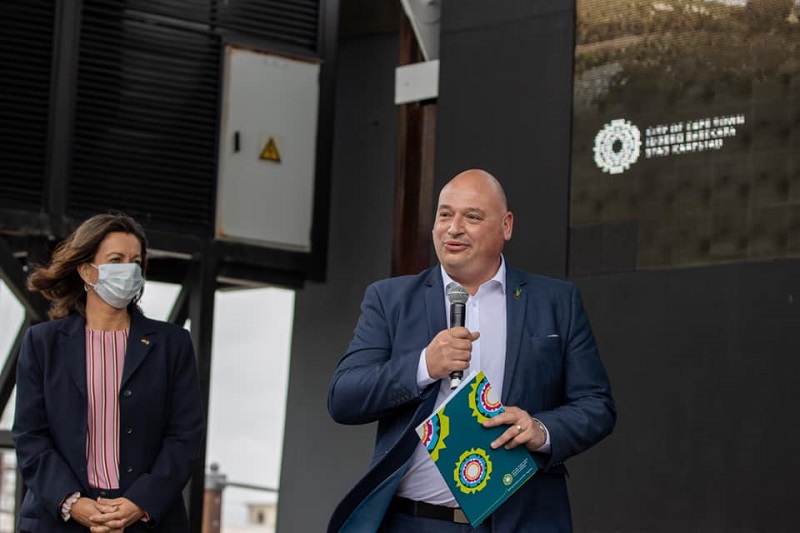City Launches International Destination Marketing Campaign
25 October 2021
Statement by Alderman James Vos, the City’s Mayoral Committee Member for Economic Opportunities & Asset Management
It gives me great pleasure to see that Cape Town has been voted Africa’s leading city destination in this year’s World Travel Awards (WTA). It is fitting that we got the news just a day before the launch of the City’s destination marketing campaign that aims to bring the world back to the Mother City.
And a round of applause to the teams at Table Mountain, which was voted the continent’s leading tourist attraction, and Cape Town International Airport, which was awarded the title of Africa’s leading airport. These awards are recognition of your sterling work during extraordinarily difficult times. Looking to the future, I believe that it will be products and experiences just like these that will set us apart from other destinations and deliver a world-class standard to visitors.
With Cape Town and its landmarks receiving this recognition – especially after 20 months of the pandemic and national lockdown – it is a feather in the cap of City officials and our industry partners such as Cape Town Tourism (CTT), the City’s official Destination Marketing Organisation (DMO), who all work hard to keep our city top of mind for a global and domestic audience.
It is my distinct pleasure that the campaign that we are launching today is rooted in the City’s six pillar destination marketing communication plan that aims to capture the fullness of our offering as the Mother City and positions Cape Town as the premier destination to visit and explore, study, work, play and experience, invest, or quite simply live.
From today, and over the coming months, people using bus stops, subway stations and other high-traffic locations around Munich, London and New York will see our billboards and digital screens with scenes showing the wide variety of experiences and beauty in Cape Town.
With almost 40% of 2019’s international visitors to the Western Cape from the US, UK and Germany, our plan is to target these global markets first, especially as many Northern Hemisphere residents look to escape their harsh winter weather. It is for this reason, that I invited the three countries’ consul-generals to join us at the launch – and they obliged.
Place Marketing branding will then go out in airports in Johannesburg and Durban as part of our continued efforts to drive local travel and investment. With the national lockdown forcing many employees to work remotely, there has been an uptick in South Africans from other parts of the country packing their bags and ‘semigrating’ to our shores, and this is something I want to capitalise on.
I would like to explore how we can ramp up our marketing to places across Africa. My aim is to secure more sister city agreements and partnerships in markets across the continent. Foreign Africans comprised 74,3% of international visitors to South Africa in 2019. Through the Air Access initiative, which receives funding from the City, we have built a successful air connectivity programme with cities around the continent and worldwide, and so it makes sense to further develop this for the benefit of travel and trade, and show that Cape Town is a proudly African city.
This campaign is launching at a critical moment: the UK – the biggest single source of travellers to the Western Cape – recently announced that it had removed South Africa from its red list. The UK government’s long-awaited announcement followed weeks of lobbying by the City and our industry partners. The decision saw an immediate surge in flight bookings and some estimates say as many as 300 000 UK travellers might head our way this summer. With readers of Britain’s Telegraph newspaper voting Cape Town as their favourite city in the world for seven consecutive years and Travel + Leisure magazine’s global audience rating ours the best city in Africa and the Middle East, I think we should prepare for a massive influx of travellers!
There is similar optimism from the US: United Airlines announced this week that it will be resuming flights between New York and Johannesburg and will soon restart its Cape Town route. In 2019, we had three flights per week from New York to Cape Town, which was made possible through our Air Access initiative. I had the distinct pleasure to lead a delegation of City officials to New York for in-depth talks with the NYC & Company destination marketing group and United Airlines’ executives.
I must highlight that, while international tourists spent R19 billion in the province in 2019 (and with 97% of those travellers coming to Cape Town during their visit, we get a sense of how much of that was spent in the city), our goal with this campaign is to reach people around the world who are looking for a destination for a variety of reasons.
For instance, I am still appealing to the National Government to launch a remote worker visa. Cape Town is ranked as one of the top global destinations for digital nomads and enabling the visa – with specific parameters such as not working for a local employer – would simply require provisions to the Immigration Act for a period longer than three months.
Expanding on our marketing campaign, our DMO CTT will then roll out its ‘Find Your Freedom’ initiative, which will have interactive videos. They will also partner with tour operators, agencies and airlines such as Germany’s Lufthansa with the objective of converting interested travellers into actual visitors. My priority is to drive that conversion and see more people make bookings, because it is those bookings that benefit our local businesses and industries.
As the City’s Mayoral Committee Member for Economic Opportunities and simply as a Capetonian, I understand how dependent communities and businesses are on the visitor economy. Tourism directly contributed 3% to South Africa’s GDP in 2018 and that does not even take into account the value to industries such as manufacturing or transport.
Prior to Covid-19, around 150 000 people in Cape Town are employed in jobs related to tourism, making it the sector with the highest growth and employment potential in the city. But this is not just about one industry. We must also consider its ripple impact on other industries.
When people come to Cape Town from the other side of the country, continent or world, they don’t just come to lie on our beaches or go up the mountain (although I would argue those are reason enough!). They buy the products made by our businesses and visit the communities showing our history and cultures.
It is through the experience of travel that a local delicacy becomes a global phenomenon; a design seen on the streets of Khayelitsha makes its way to the catwalks of London, and investors of green technology initiatives in Atlantis transfer their curiosity to signing on the dotted line. This translates into more sustained livelihoods and jobs for the people of our city.
Travel reveals the opportunities and innovation that Cape Town has on offer. And that’s why our destination marketing strategy delivers our unique value proposition.
For the first time in almost two years, we can safely welcome travellers from far and wide. And they are certainly eager to return!
This is our moment, Cape Town.


